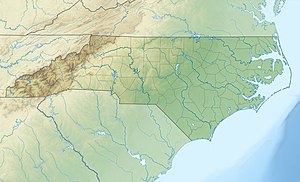Faulkner Creek is a 5.98 mi (9.62 km) long 2nd order tributary to the Ararat River in Surry County, North Carolina.
| Faulkner Creek Tributary to Ararat River | |
|---|---|
| Location | |
| Country | United States |
| State | North Carolina |
| County | Surry |
| Physical characteristics | |
| Source | south side of Slate Mountain |
| • location | about 6 miles northeast of Mount Airy, North Carolina |
| • coordinates | 36°32′24″N 080°31′02″W / 36.54000°N 80.51722°W[1] |
| • elevation | 1,640 ft (500 m)[2] |
| Mouth | Ararat River |
• location | Bannertown, North Carolina |
• coordinates | 36°29′38″N 080°35′26″W / 36.49389°N 80.59056°W[1] |
• elevation | 994 ft (303 m)[2] |
| Length | 5.98 mi (9.62 km)[3] |
| Basin size | 5.24 square miles (13.6 km2)[4] |
| Discharge | |
| • location | Ararat River |
| • average | 7.92 cu ft/s (0.224 m3/s) at mouth with Ararat River[4] |
| Basin features | |
| Progression | Ararat River → Yadkin River → Pee Dee River → Winyah Bay → Atlantic Ocean |
| River system | Yadkin River |
| Tributaries | |
| • left | unnamed tributaries |
| • right | unnamed tributaries |
| Bridges | NC 103 (x3), Quaker Road, Lovers Lane, Welcome Baptist Church Road |
Variant names
editAccording to the Geographic Names Information System, it has also been known historically as:[1]
- Forkners Creek
Course
editFaulkner Creek rises on the south side of Slate Mountain about 6 miles northeast of Mount Airy, North Carolina. Faulkner Creek then flows southwest to join the Ararat River at Bannertown.[2]
Watershed
editFaulkner Creek drains 5.24 square miles (13.6 km2) of area, receives about 48.0 in/year of precipitation, has a wetness index of 324.92, and is about 59% forested.[4]
See also
editReferences
edit- ^ a b c "GNIS Detail - Faulkner Creek". geonames.usgs.gov. US Geological Survey. Retrieved 19 September 2020.
- ^ a b c "Faulkner Creek Topo Map in Surry". TopoZone. Locality, LLC. Retrieved 19 September 2020.
- ^ "ArcGIS Web Application". epa.maps.arcgis.com. US EPA. Retrieved 19 September 2020.
- ^ a b c "Faulkner Creek Watershed Report". US EPA Geoviewer. US EPA. Retrieved 19 September 2020.

